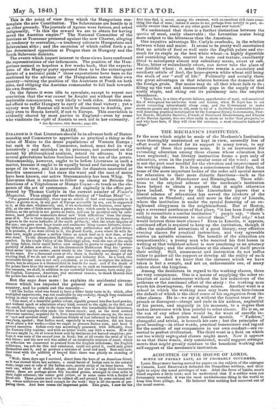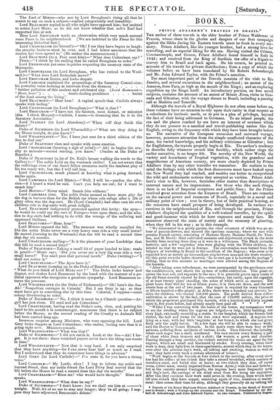ACOUSTICS OF THE HOUSE OF LORDS.
SCENE OF FRIDAY LAST, AS IT PROBABLY OCCURRED.
LORD BEAUMONT having moved for papers on the subject of the outrages at Catania, Lord BROUGHAM defended the Neapolitan soldiery, and their right to enjoy the usual privileges of war. After the fever of battle, men's blood requires a little vent; and he understood that if a soldier were not fortunately wounded, it was the most unwholesome thing in the world to keep him from pillage, &c. Ho believed that nothing had occurred out of the usual course.
• The Earl of MINTO—who saw by Lord Broughtun's rising all that he meant to say on such a subject—replied categorically and inaudibly.
Lord BEAUMONT replied to all who might have opposed him; but omitted to notice Lord Minto, as he did not know whether that nobie Earl had supported him or not.
Here Lord Brien:runes( made an observation which very much amused some Peers in his neighbourhood. [We are indebted to the Times for this interesting historical fact.]
Lord CHANCELLOR (to himself)—" Oh! I see they have begun to laugh: the atrocity business must be over, and I had better announce that the motion has been agreed to." (He makes the announcement.) Lord BEAUMONT (to a Peer next him)—" What does Cottenham say?" PEER—" I think by his smiling that he called Brougham to order." Lord REDESDALE put some inquiries respecting the sanatory state of the
Metropolis.
Lord CHANCELLOR (to Lord Brougham, who has retired to the Wool- sack)—" What does Lord Redesdale move?"
Lord Brtotmnsm listens, and looks despair.
Lord CARLISLE explained the proceedings of the Sanatory Commission;
his powerful voice looming at intervals from the distance "further pollution of this ancient and celebrated city. (Lord Beaumont- " Hear, hear!') death-dealing pestilence . . . . burial of the dead among the living "
Lord BEAUMONT—" Hear hear! A capital speech that. Carlisle always speaks with feeling."
Lord CHANCELLOR (to Lord Brougham)—" What is that?"
Lord BROUGHAM—" I have not the faintest, most distant, or minutest idea. I think Morpeth—Carlisle, I mean—is dreaming that he is in the Sanatory Association."
Lord STANLEY (to Lord Aberdeen)—" When will they finish this debate?"
Duke of RICHMOND (to Lord Wharncliffe)—" What are they doing in the House tonight, do you know?"
Lord WHARNCLIFFE—" No; I have just sent for a third edition of the Sun, to find out."
Duke of BEAUFORT rises and speaks with some emotion.
Lord CHANCELLOR (heaving a sigh of relief)—" Ahl he begins the cru- elty to animals—second reading, you know." (Smiles at the Duke of Beaufort.) Duke of BEAUFORT (a jet of Dr. Reid's breeze wafting the words to the Gallery)—" The noble Lord on the woolsack smiles! I am not aware that the sufferings even of our dumb fellow creatures merit the lambent play of
his too ready wit; but this I will tell him
Lord CHANCELLOR, much pleased at knowing what is going forward, smiles again.
Lord CAMPBELL (to Lord Minto)—" Well, I will be—pardon the allu- sion—if I heard a word he said. Can't you help me out; for I want to smash him."
Lord MINTO—" Never mind. Smash him without."
Lord CAMPBELL rises. The noble Duke seemed to have more pity for the dog in harness than for the British tar whose sole refuge after a life of glory often was the dog-cart. He (Lord Campbell) had often seen his own children ride in dog-carts with great delight.
Lord BEAUMONT indignantly protested against this levity: the eyes— he would he could say the ears of Europe—were upon them; and the allu- sion to dog-carts had nothing to do with the wrongs of the suffering and oppressed Sicilians.
Lord BEAUFORT—" Hear, hear!"
Lord MINTO opposed the bill. The measure was wholly uncalled for. Did the noble Duke never see a very heavy man ride a very small horse? He moved (turning to the Woolsack) that the bill be read a second time that day six months.
Lord CHANCELLOR smiling—" Is it the pleasure of your Lordships that this bill be read a second time?"
Duke of BEsurour—Taking a small bit of paper handed to him: reads in pencil—" Minto says, 'Did you never see a very big man ride a very small horse?' You can't pass that personal insult." Duke (writing)—" I shall not notice it."
Lord Cesscsmort—" The Ayes have it."
Lord BEAUMONT (coming up to the Duke of Beaufort and whispering)— " What do you think of Lord Minto now?" The Duke looks horror and disgust, and shakes Lord Beaumont by the band with the manner of a po- litical opponent who recognizes a generous sympathy. Lord Beaumont re- turns the pressure.
Lord WHARNCLIFFE (to the Duke of Richmond)—" Ohl here's the Sun. Ah! 'Neapolitan outrages in Catania.' But I see Grey is up; so they must have got to something else by this time. Colonial, I suppose—some colony threatening to rebel.
Duke of Ricnmosa•—" No, I think it must be a Church question—Ar- gyll has just risen. I'll send and ask Cottenham."
Lord CHANCELLOR, having read the Duke's note, rises, and, putting his hand to his mouth a la costermonger, announces that there is no subject before the House; as the second reading of the Cruelty to Animals Bill had been carried long ago.
Immense surprise among Ministers, who were opposing the bill. Lord Grey looks daggers at Lord Cottenham; who smiles, feeling sure that it is going right now. Ministers consult.
Lord WHARNCLIFFE—" What was that?"
Duke of RICHMOND—" I did not catch it. Look at the Sun—Ah! I for- pt. It is not there: these wretched papers never have the thing one wants m time."
Lord MIA RECLIFFE—" NOW that is very hard. I am Only surprised that they have anything—for I can never hear half so much as I read. But I understand that they do sometimes have things in advance."
Lord GREY (to Lord Carlisle)—" You state it, for you have a strong voice."
Lord CARLISLE—" My Lords, ahoy! I beg to inform my noble and learned friend, that my noble friend the Lord Privy Seal moved that the bill before the House be read a second time this day six months."
Lord CILINCELLOR" Bless me! who would have thought." Rises and speaks.
Lord WHARNCLIFFE—" What does he say?" Duke of Iticumown—" I don't know: but we shall see him at —'s tonight. Well, it's of no use to stay any longer; they 're all going; I sup- pose they have adjourned Beaumont'e debate."



























 Previous page
Previous page